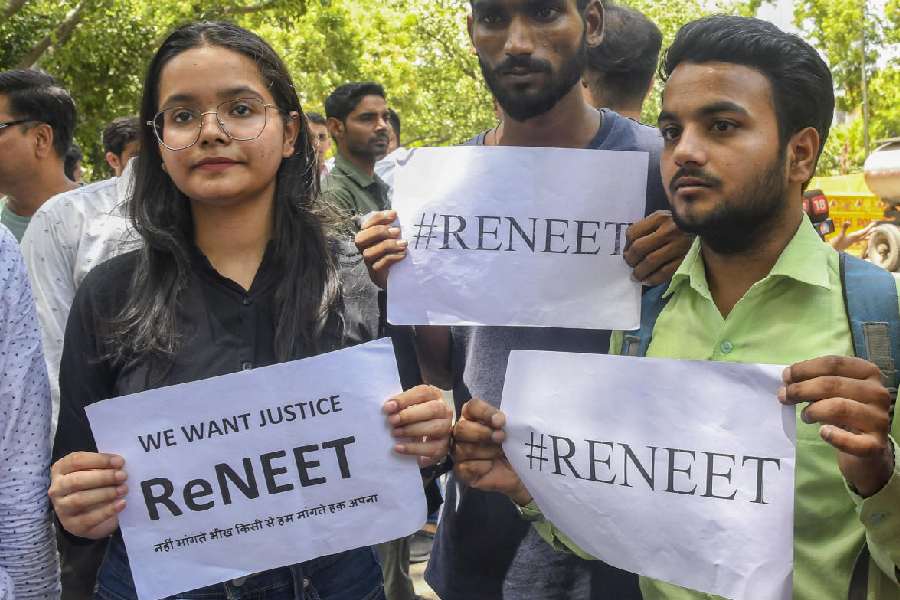The Union government has proposed to set up “computer-based test centres” or CBTs at central or state-run educational institutions to reduce the dependency on private players in conducting national-level college entrance exams.
Officials said the Union education ministry had decided on the measure after question paper leaks marred the National Eligibility-cum-Entrance Test (NEET) and the National Eligibility Test (NET) this year. The JEE Main too has in the past been hit by paper leak allegations.
Some educationists were sceptical, arguing that a more fruitful way of checking leaks and other kinds of cheating would be to ensure the secure transport and storage of physical question papers, and the appointment of people of integrity as exam
hall invigilators.
All the centralised entrance tests are conducted by the National Testing Agency (NTA), which lacks its own staff and hires private service providers to set up CBTs at spaces rented by them, usually at private or public schools and colleges. Some private organisations have dedicated test centres.
Establishing a CBT involves getting a large number of computers and setting up a local server — and arranging for a strongroom if the exam involves physical question papers (like the NEET).
All this is now the province of the private service providers. The NTA merely appoints a city coordinator and a centre coordinator from among the faculty or administrators at the schools or colleges where the CBT is set up.
The NTA also deploys flying squads for supervision but their number is small, two education ministry officials said.
They said the idea behind the proposal is that if the NTA sets up the CBTs, there would be no leak of physical question papers from the strongroom, or of online questions during transfer to the local server/ computers shortly before the exam.
On September 20, the education ministry met senior officials handling higher education and technical education in the states and proposed the idea, ministry sources said.
“The states were requested to share data on the vacant space available in their institutions where CBTs can be set up. Some of the states have shared the data,” an official said.
He said the ministry had also discussed the subject with the vice-chancellors of central universities and the directors of the IITs, NITs and other central institutions.
However, physical question papers can be leaked also during transport to the strongrooms, a process handled by the NTA. The Supreme Court judgment on the NEET paper leak this year highlighted lapses such as the use of e-rickshaws for the ferrying of question papers to exam centres.
The questions — whether set online or on paper — can also be leaked from inside the exam hall, with the answers smuggled back through electronic gadgets, thus underlining the importance of spot supervision.
Besides, sources said, question papers can be leaked while being printed or digitalised (for online exams) – processes usually handled by private agencies hired by the NTA.
Rajeev Kumar, former computer science professor at IIT Kharagpur and an expert on the conduct of entrance tests, said the NTA setting up CBTs at government institutions was not enough to address exam mismanagement and paper leaks.
“Are there no corrupt people at government institutions? The responsibility for the fair conduct of exams lies with the people handling the test and those deployed for supervision,” he said.
Kumar cited the examples of the JEE Advanced and BITSAT Pilani, where the institutions assign the job of supervision to their own faculty members.
He said that senior academics and not bureaucrats were the right people to advise the government on the subject.
“Bureaucrats may not be able to understand the intricacies involved in matters of academic interest and academic manipulation. The people involved in CBT administration and the strategy for the fair conduct of tests (NTA bosses) should study the best models in India and abroad,” he said.
The apex court has affirmed NEET paper leaks in Hazaribagh and Patna this year. The CBI has indicated that 155 candidates benefited.










